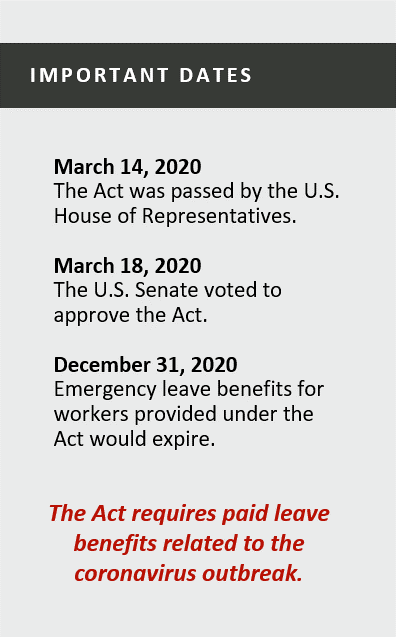Congress Passes Coronavirus Law Requiring Paid Employee Leave

On Wednesday, March 18, 2020, the U.S. Senate voted to approve a coronavirus relief bill (the Act) that was passed by the U.S. House of Representatives over the weekend.
President Trump is expected to sign the bill into law. The Act requires employers to provide paid leave for some employees related to the coronavirus (COVID-19) pandemic, among other measures. The Act takes effect no later than 15 days after it is signed by the president.
Emergency Paid Sick Leave
The Act requires two weeks of paid sick leave for government workers and employees of companies with fewer than 500 employees. Leave must be made available immediately to workers who are symptomatic or are under an order or advice to quarantine or self-isolate, who have to care for a family member under such an order or advice, or who have a child whose school or child care facility has closed (or whose child care provider is unavailable) due to the coronavirus.
Emergency Family and Medical Leave Act
The Act provides FMLA rights for some employees of companies with fewer than 500 employees, requiring partially paid leave after 10 days when an employee is unable to work or telework due to school or child care closures related to the coronavirus.
Other Provisions
The Act provides funding for economic assistance and requires health plans to cover COVID-19 testing at no charge. A refundable tax credit for employers that provide paid leave benefits as required by the Act is also included. The U.S. Treasury is expected to use its regulatory authority to advance funds to some small businesses to cover the cost of providing paid sick leave.
SSG strongly recommends visiting the following links for the most accurate and up-to-date information:
In light of the Coronavirus outbreak, Strategic Services Group (SSG) will continue to provide health and compliance updates related to COVID-19 and the risks posed by this virus, as well as monitor the health and safety of each of our team members as we balance the needs of our clients and the community as a whole. This information is provided for educational purposes only. It is not intended to provide legal advice. You should not act on this information without consulting legal counsel or other knowledgeable advisors.


 Prev
Prev

